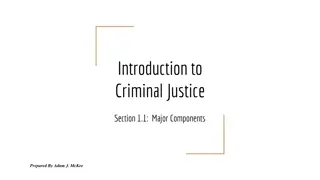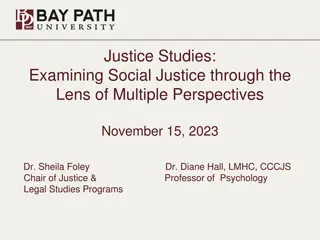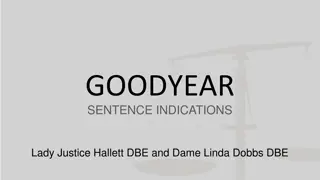Comparative Analysis of Plea Bargaining in Criminal Justice Systems
Research by Dr. Dorota Czerwinska delves into the practice of plea bargaining, examining its roots, benefits, and ethical considerations in various countries such as the USA, England, France, Germany, Italy, and Poland. The study explores the reasons behind the development of plea bargaining and questions its impact on substantive justice and defendant rights. Funding provided by the Polish National Centre of Science underlines the significance of this comparative perspective on negotiated justice mechanisms.
Download Presentation

Please find below an Image/Link to download the presentation.
The content on the website is provided AS IS for your information and personal use only. It may not be sold, licensed, or shared on other websites without obtaining consent from the author. Download presentation by click this link. If you encounter any issues during the download, it is possible that the publisher has removed the file from their server.
E N D
Presentation Transcript
Dr Dorota Czerwiska, Assistant Professor Chair of Criminal Procedure Faculty of Law, Administration and Economics University of Wroc aw dorota.czerwinska@uwr.edu.pl Plea Bargaining - a Comparative Perspective
The presented research is financed by the Polish National Centre of Science under grant agreement no. UMO-2019/35/N/HS5/03125. Plea bargaining and similar negotiated justice mechanisms are now a common feature of the criminal justice systems General idea: the defendant waives their right to trial in exchange for agreed benefits, such as a reduction of the number or weight of the charges (in common law countries) or getting an agreed sentence main purpose: save time and money of the criminal justice system by fastening and simplifying the procedure This is what the state gets ? what does the defendant get? Are there any incentives? Are they fair in light of the principle of equality and substantive justice? Are they forms of pressuring the defendant to plead guilty?
The presented research is financed by the Polish National Centre of Science under grant agreement no. UMO-2019/35/N/HS5/03125. Plea bargaining history G. Fisher: the roots are in XIX century, Massachusets Back then the prosecutors had other jobs at the same time they did not have time to attend trials Other reasons for their development and triumph around the world: Growing complexity of crime (economic, cyber, environmental) Growing number of procedural guarantees after WWII Increasing problem of overlong proceedings Willingness to make the accused the subject, not the object of criminal proceedings Consensual rather than forced methods of resolving conflict Are the reasons pragmatic or rather axiological?
The presented research is financed by the Polish National Centre of Science under grant agreement no. UMO-2019/35/N/HS5/03125. Countries: USA mother-country for plea bargaining England a different common law attitude towards plea bargaining France particularly protective over the defendant, well-balanced negotiated justice solutions with a broad catalogue of possible sanctions and benefits Germany once free from negotiated justice, today characterised by a particularly active role of the court Italy important field of research in the field of criminal procedure in general; an interesting system of fixed benefits for the defendant who waives their right to trial Poland little incentives and low level of procedural protection of the defendant engaging in negotiations; strong position of the victim
The presented research is financed by the Polish National Centre of Science under grant agreement no. UMO-2019/35/N/HS5/03125. USA Mother country Types of plea: Plea of guilty Plea of not guilty Alford plea - I am not guilty but I plead guilty because I know the evidence suggests that I am guilty Nolo contendere plea - I do not contest the charge Types of plea bargaining: charge reductions (e.g. theft instead of burglary) count reductions (e.g. one count of burglary instead of three counts) sentencing bargains they might consist in joint submissions of the prosecutor and the defendant with regard to the punishment Broad discretion of the prosecutor and the court More than 90% of cases (usually estimated as 97%) is resolved by plea bargaining ? this is the main model, trial is an exception
The research discussed in the paper is financed by the Polish National Centre of Science under grant agreement no. UMO- 2019/35/N/HS5/03125. USA rights of defence Defence counsel usually present ? but a complex set of extra-procedural dependencies sometimes makes the effectiveness of legal assistance doubtful Standard of effective legal assistance described by the Supreme Court Effective change of plea if the agreement fails Unclear disclosure rules: is there a Brady duty to disclose exculpatory evidence before trial for the purpose of negotiations? a circuit split in that matter
The research discussed in the paper is financed by the Polish National Centre of Science under grant agreement no. UMO- 2019/35/N/HS5/03125. USA Victim absent The court focuses on the voluntariness of the waiver, not the facts of the case ? guilty in adversarial systems than of the confession of guilt in inquisitorial systems different role of plea of
The presented research is financed by the Polish National Centre of Science under grant agreement no. UMO-2019/35/N/HS5/03125. USA sentencing discount Part E of the Sentencing Guidelines refers rather to genuine cooperation than the agreement as to the plea of guilty Empirical data: The risk of getting an unsuspended sentence of prison is 2,7 times higher if the defendant goes to trial (Ulmer, Bradley 2006) Statistically women gain more from pleading guilty (Dusek 2010) The punishment inflicted for drug crimes in Cook County in 2004-2007 were 23% lower in plea bargaining procedures for comparable crimes (Dusek 2010) In some cases the sentencing discount amounted to 500% (Neubauer, Fradella 2018) There is also some contradicting data available that suggests there is no actual gain (Rhodes 2005)
The presented research is financed by the Polish National Centre of Science under grant agreement no. UMO-2019/35/N/HS5/03125. England Plea bargaining exists, but is not identical with its American version the role of the court might be more active Plea of guilty very common (around 70%) but not always a result of a bargain very hard to distinguish them statistically Statistically the lawyer is present, especially in the Crown Court Early Guilty Plea scheme additional time pressure; if there is a deficit of trust in the system the innocent defendants might take the pragmatic approach; the system is transparent though Late disclosure influences the defendant s decision the precedent of R v Goodyear limits the possibilities of pressuring the defendant by indicating sanction scissors but scholars point out its inconsistent application
The presented research is financed by the Polish National Centre of Science under grant agreement no. UMO-2019/35/N/HS5/03125. England The Sentencing Guidelines present a clear roadmap of awarding benefits for pleading guilty - the court takes into account: at what stage of proceedings the defendant entered a plea of guilty in what circumstances it occurred; however, the strength of the prosecutor s case is of no importance The sentencing discount is: if the defendant pleads guilty during the first hearing - afterwards but before the first day of trial to 1/10 on the first day of trial 1/10 to 0 during trial Special rules regarding murder The discount only refers to repressive, not preventive measures If the leniency already consists in inflicting a milder type of punishment, its dimension generally should not be further reduced
The presented research is financed by the Polish National Centre of Science under grant agreement no. UMO-2019/35/N/HS5/03125. France Main institution: comparution sur reconnaissance pr alable de culpabilit (CRPC) proposed by the prosecutor during the investigation Rights of defence: Mandatory participation of the counsel 10-day period of reflection upon request Full access to the case file Fully recorded talks If agreement fails, previous statements inadmissible and removed from the case dossier Complex set of rules regarding benefits resulting from the settlement but no indication of trial tax
The presented research is financed by the Polish National Centre of Science under grant agreement no. UMO-2019/35/N/HS5/03125. France Role of the court more active Victim has the right to compensation and their general position is taken into account
The presented research is financed by the Polish National Centre of Science under grant agreement no. UMO-2019/35/N/HS5/03125. France sentencing discount The punishment may not exceed neither 3 years of imprisonment nor half of the upper statutory limit for the crime concerned Both imprisonment and fine may be suspended regardless of the general rules In 2019 new important benefits were introduced the parties may make an agreement with regard to: revoking (or not) a previously awarded suspension of a sentence for another crime not inflicting any ancillary orders that would normally be mandatory for the crime concerned Non-disclosure of the conviction in the main part of the criminal record (the information would only be available to authorities of the criminal justice system)
The presented research is financed by the Polish National Centre of Science under grant agreement no. UMO-2019/35/N/HS5/03125. Italy Main consensual institution: applicazzione della poena su richiesta delle partie (patteggiamento) Very interesting example of a conflict between the legislator and the constitutional tribunal around the introduction of negotiated justice Victim no real impact on the bargain
The presented research is financed by the Polish National Centre of Science under grant agreement no. UMO-2019/35/N/HS5/03125. Italy rights of defence: Mandatory participation of the counsel during investigation and court proceedings Full access to the case dossier General inadmissibility of statements made to the Police in the absence of the defence counsel Admission of guilt not required to enter a settlement (in theory and in practice) Clear rules of awarding an interesting variety of sentencing discounts
The presented research is financed by the Polish National Centre of Science under grant agreement no. UMO-2019/35/N/HS5/03125. Italy sentencing discount: a fixed sentencing discount of 1/3, given in the end of a theoretical sentencing reasoning process; the punishment may not exceed 5 years if the imposed penalty does not exceed 2 years of imprisonment, there are additional benefits available: lack of ancillary orders, except forfeiture, and a release from obligation to incur the costs of proceedings shorter deadlines of expungement a conviction for a fine and/or ancillary orders in this type of proceedings does not constitute an obstacle for conditional suspension of other penalties the judgment does not bind civil and administrative courts so the question of guilt may be challenged by the defendant e.g. in civil proceedings for damages
The presented research is financed by the Polish National Centre of Science under grant agreement no. UMO-2019/35/N/HS5/03125. Germany main consensual institution: Absprachen (Verst ndigung) very interesting history: plea bargaining evolved in practice with no legal basis, was then noticed by the courts and regulated afterwards only in 2009 Takes place only in court proceedings Victim no real impact
The presented research is financed by the Polish National Centre of Science under grant agreement no. UMO-2019/35/N/HS5/03125. Germany Defence counsel usually present Full access to the case file Risk of withdrawal of the consent by the prosecutor or the court even if no new circumstances occurred ? previous confession inadmissible but stays in the case dossier Constitutional Court 2013: pressuring the defendants by indicating disproportionate sanction scissors ; the duty to verify the credibility of confession in light of other evidence often not fulfilled by the courts improper practice of
The presented research is financed by the Polish National Centre of Science under grant agreement no. UMO-2019/35/N/HS5/03125. Germany sentencing discount no particular benefits; however, the punishment may be more lenient within the statutory limits there is empirical data (Altenhain 2020) that in fact the punishments inflicted as a result of Absprachen are more lenient (by to ) - the difference is called Sanktionsschere (sanction scissors) the court is entitled to indicate the maximum punishment in case of a credible confession but not the punishment it intends to inflict in case of no confession according to the Federal Constitutional Court, the sanction scissors cannot be excessive nor openly communicated as it would violate: general rules of legalism and equitable punishment the defendant s freedom of decision and freedom from self-incrimination
The presented research is financed by the Polish National Centre of Science under grant agreement no. UMO-2019/35/N/HS5/03125. Poland two main consensual institutions: conviction without trial - until the end of investigation voluntary submission to criminal liability before scheduling the date of trial no later than at the beginning of trial Introduced in 1997, then amended in 2003, 2015, 2016 Main characteristic: particularly strong position of the victim who has the right to bindingly oppose to the conclusion of proceedings that way
The presented research is financed by the Polish National Centre of Science under grant agreement no. UMO-2019/35/N/HS5/03125. Poland rights of defence Defence counsel usually not present Access to the case file might be restricted Unrecorded negotiations If the agreement fails, previous admission of guilt admissible
The presented research is financed by the Polish National Centre of Science under grant agreement no. UMO-2019/35/N/HS5/03125. Poland sentencing discount Before April 2016: additional possibilities of suspending the sentence or going below the statutory minimum sentences Since April 2016: no particular benefits according to the law the punishment may be more lenient within the statutory limits but there is no empirical data to confirm that they are practical experiences suggest that the defendants cannot be sure they gain anything from the agreement abolishing previous mechanisms of leniency may be one of the reasons of a huge collapse in the frequency of entering agreements since 2016 (from more than 50% convictions to less than 30%)
The presented research is financed by the Polish National Centre of Science under grant agreement no. UMO-2019/35/N/HS5/03125. Percentage of convictions in special proceedings out of all the convictions Conviction without trial Voluntary submission to criminal liability Penal orders 50.0% 45.0% 40.0% 35.0% 30.0% 25.0% 20.0% 15.0% 10.0% 5.0% 0.0% 2013 40.2% 2014 38.2% 2015 40.7% 2016 45.7% 2017 33.1% 2018 27.5% 2019 23.3% Conviction without trial Voluntary submission to criminal liability Penal orders 8.2% 8.7% 8.6% 6.5% 6.3% 5.3% 5.3% 11.7% 11.8% 10.6% 11.9% 15.8% 21.2% 23.5%
The presented research is financed by the Polish National Centre of Science under grant agreement no. UMO-2019/35/N/HS5/03125. Comparative remarks on the rights of defence Crucial factors: Participation of the defence counsel Access to the evidence No time pressure Formalisation and recording of the negotiations (in)admissibility of previous statements in further proceedings if the agreement fails Lack of pressure resulting from a clear indication of an immense trial tax France as the most protective country the guarantees do not seem to jeopardise the benefits of the agreement; doubts expressed by legal representing adversarial model with regard to disclosure; obvious doubts as to the statements scholars from countries admissibility of previous
The presented research is financed by the Polish National Centre of Science under grant agreement no. UMO-2019/35/N/HS5/03125. Comparative remarks on sentencing discount Most countries provide a sentencing discount of some sort: a fixed one (Italy), applied in the end of sentencing, a system of guidelines for providing different levels of fixed sentencing discounts (England), a broad discretion of the prosecutors or the court (USA) Some countries (Italy, France) provide broad possibilities of awarding interesting benefits unrelated to the dimension of the punishment itself In Germany and Poland the fact of entering the agreement does not influence statutory limits of the punishment in any way; however, it may be alleviated in practice within the regular statutory limits but without prejudice to the general rules of just and equitable punishment
The presented research is financed by the Polish National Centre of Science under grant agreement no. UMO-2019/35/N/HS5/03125. Comparative remarks on sentencing discount Some sort of incentive is needed and justified In American legal writing the sentencing discount system is often criticised for its: lack of transparency unacceptable consequence of imposing an additional sanction for enjoying constitutional rights ? (sentencing discount = trial tax?) Providing more transparency in England, France or Italy does not eliminate this last issue however, it is still better than full discretion The sanction scissors shall be moderate in order not to violate the defendant s voluntariness and freedom from self-incrimination Placing the emphasis on side-benefits as in Italy or France balances the model of awarding sentencing discounts in negotiated justice instruments
Thank you for your attention. Dr Dorota Czerwi ska, Assistant Professor Chair of Criminal Procedure Faculty of Law, Administration and Economics University of Wroc aw dorota.czerwinska@uwr.edu.pl
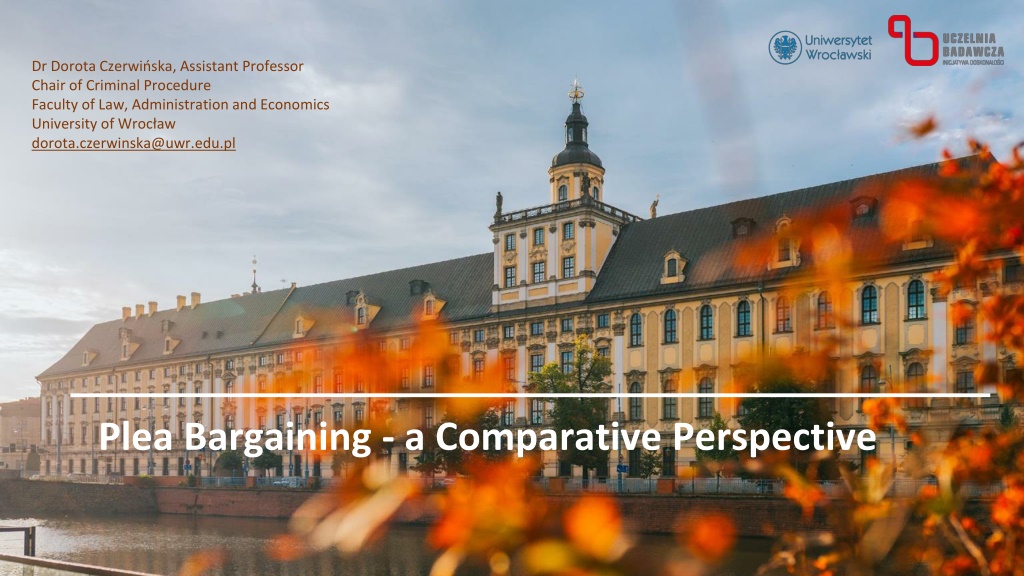


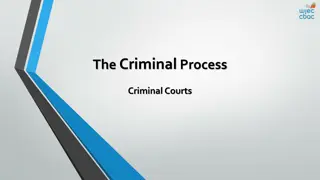


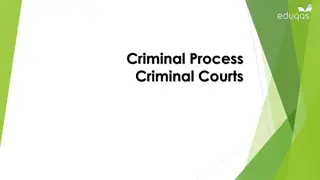


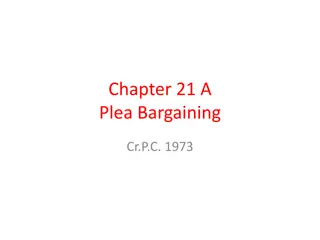





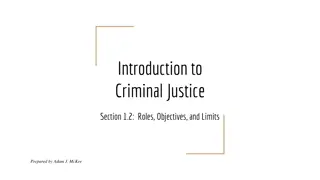
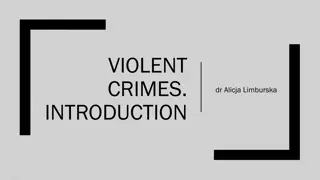



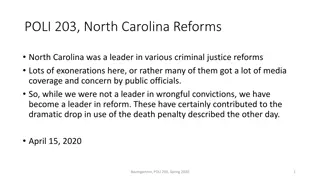

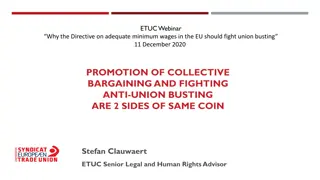

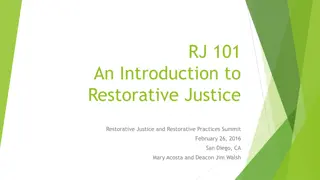
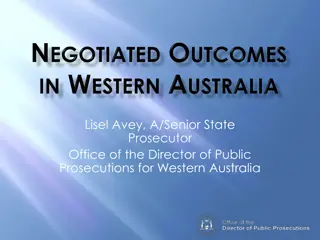

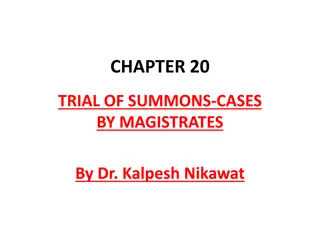




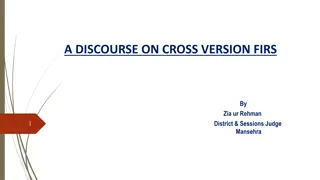

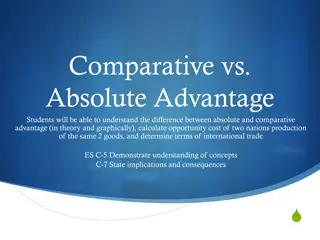
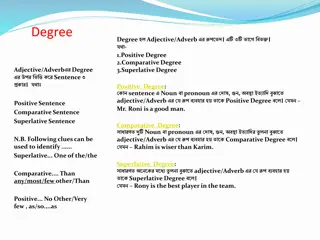

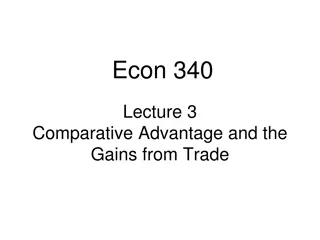
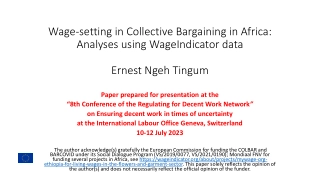


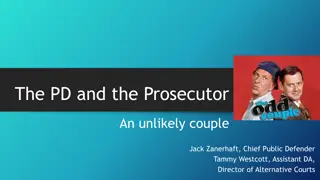

![Briefing on the Criminal Procedure Amendment Bill [B12-2021] to the Portfolio Committee on Justice and Correctional Services](/thumb/157093/briefing-on-the-criminal-procedure-amendment-bill-b12-2021-to-the-portfolio-committee-on-justice-and-correctional-services.jpg)

